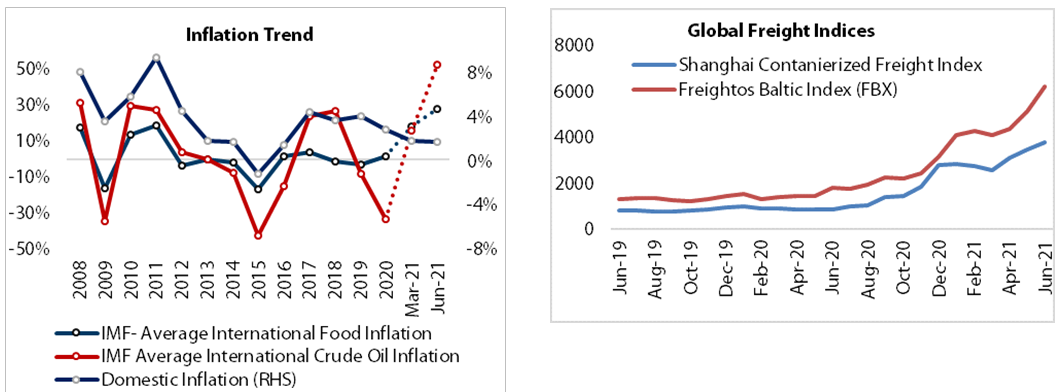
According to the World Bank[1] , the impact of COVID-19 on commodity markets was felt acutely on energy prices, reflecting the pandemic’s effect on global economic activity, including the demand for tourism and travel. Crude oil prices declined dramatically in 2020, falling by 33.4 percent, the largest decline in such prices since 2015. This sharp fall occurred despite the supply cuts announced by OPEC and reduced drilling activity in the United States.
In contrast, international food prices increased by 2.0 percent despite weakened demand for commodities such as vegetable oil, sugar, wheat, maize and rice. In most cases, labour shortages[2], export restrictions and logistical bottlenecks were responsible for the relative stability of food commodity prices during 2020.
However, in 2021, promising global growth prospects resulted in rising commodity prices during the first half of the year, with international food prices up by 27.6 percent and crude oil prices increasing by 52.0 percent. These developments have resulted in oil prices returning to 2019 levels, while food prices are their highest since 2014. According to the World Bank[3], the likelihood of prices remaining close to current levels for the remainder of the year hinges on the successful containment of the virus and production decisions of major commodity producers.
Rising freight costs have also contributed to increased import prices during 2021. Global freight indices increased by over 200 percent at the end of June 2021, the result of a lack of transport capacity to match the surge in global demand. Additionally, persistent lockdowns as a result of the COVID-19 outbreak in some markets have negatively impacted supply and export volumes and contributed to higher freight costs to producers and higher prices of goods to consumers.
The Energy Information Association (EIA) [4] acknowledges the heightened uncertainty related to the ongoing economic recovery, but forecasts that global oil production will outpace the growth in oil consumption and contribute to declining oil prices in 2022. Given the high level of dependence that Barbados has on international oil, global energy market developments will directly impact domestic prices such as diesel and gasoline prices at the pump and the electricity bill via the Fuel Clause Adjustment.

[1] Impact of COVID-19 on Commodity Markets Heaviest on Energy Prices; Lower Oil Demand Likely to Persist Beyond 2021 (worldbank.org)
[2] COVID-19 and the food and agriculture sector: Issues and policy responses (oecd.org)
[3] Commodity Prices to Stabilize after Early 2021 Gains, World Bank
[4] Short-Term Energy Outlook - U.S. Energy Information Administration (EIA)